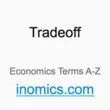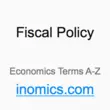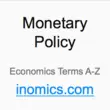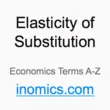-
- Economics Terms A-Z
- Posted 5 years ago
Compromis
en it es de fr
-
- Further Education
- Posted 5 years ago
How to Survive Your Economics PhD Thesis Defense
Once you've handed in your thesis, you still have one big challenge to overcome before you're finished with your PhD: the thesis defense. This is an opportunity for you to present your research publicly and to answer questions about it from your thesis committee. The process can be tough going, especially if you've never had to do anything like this before. That being said, there are a few ways to make sure you survive – and even perform very well in – your thesis defense.
en it es de
-
- Blog Post
- Posted 5 years ago
8 Halloween Costumes for Economists
In keeping with the season, we have put together a short list of ideas, collected from various economics-related source, which may be useful if you are attending a Halloween party full of like-minded economists.

-
- Economics Terms A-Z
- Posted 5 years ago
La politique fiscale
en it es de fr
-
- The Internet Speaks
- Posted 5 years ago
Top Memes All Economists Will Love
Economics is serious business, but sometimes we all need a break! And that's when the internet is there: to sympathise, to commiserate, and to make us smile at the end of a tough day. Fortunately the stereotype of economists being humourless is not true – there are plenty of fun and funny economists who are out there sharing their humour. From students to senior professors, there are memes on the internet to express all aspects of the study and practice of economics. Below you'll find 10 of our favourite memes that we know all economists will love!

-
- The Power of a Discipline
- Posted 5 years ago
Can Economics Prevent War?
Is economics a useful tool for maintaining peace? Can nations use economic policies to avoid war? With globalization an established fact of modern politics, this question is more important than ever. In this piece, we'll consider arguments both for and against.
en it es de
-
- Study Abroad Article
- Posted 5 years ago
Tuition Fees at Czech Universities – How and Where to Learn Czech and Study for Free
More than 43.000 foreign students are currently studying at universities in the Czech Republic. Many of them don't have to pay tuition fees, because they are enrolled in Czech taught degree programmes and therefore they study under the same conditions as Czech students do. While it might be difficult right now to move during the pandemic, it's always worth keeping yourself informed of what your future options are.

-
- The Freight Shipping Industry
- Posted 5 years ago
Alarming Trend due to COVID-19 – Maritime Piracy on the Rise
Speaking of current issues under the influence of COVID-19, events on the water, or sea, which is another parallel world with its written and unwritten laws, are somewhat undeservedly forgotten. Looking at the latest data, we need to talk about a very worrying trend over the last year. Although global maritime piracy is not as high as between 2009 and 2012, in 2020 the number of pirate attacks and attempts has increased by 24% compared to 2019.

-
- Study Abroad Article
- Posted 5 years ago
Letters of Reference for UK University Applications
Regardless of where you are applying, nearly every course requires at least one, if not two or three letters of reference. Such documents are sometimes also referred to as letters of recommendation. In general, it is best for reference letters to be written by professors with whom you have worked closely, so they can offer detailed insight into you and your work.

-
- Study Advice
- Posted 5 years ago
MBA vs PhD in Economics
Every year thousands of economics students decide to continue education, either straight away after graduation or after a year or two of “real world” work experience. Often at this point comes the question: should I pursue a PhD or enroll in a Master of Business Administration program?

-
- Blog Post
- Posted 5 years ago
Which countries own the world's largest container ships?
According to the International Chamber of Shipping, more than 50,000 container ships are currently active in the oceans. These are large vessels that carry cargo in closed containers. The capacity of a container ship is measured in twenty-foot equivalent units (TEU), while a vessel with a capacity of more than 20,000 TEU is defined as a very large container ship.

-
- Looking Ahead
- Posted 5 years ago
Most in Demand Jobs in Economics Today
When it comes to choosing a career path, pragmatic people know that they shouldn't select a job purely based on how interesting they find it. In order to have a stable, long-term career, the job path chosen should be based on the needs of the market as well as the interests and skills of the individual. For this reason, we've rounded up some potential jobs for economists which are highly in demand today.

-
- A Career in Economics
- Posted 5 years ago
Additional Courses to Improve Your Prospects in a Career in Economics
If you're doing an economics degree and thinking about ways to maximise your career prospects once you graduate, there are lots of courses outside the realm of economics for you to choose from.

-
- Economics Terms A-Z
- Posted 5 years ago
La politique monétaire
en it es de fr
-
- The Moneyball Effect
- Posted 5 years ago
Statistics in Sport
‘Chance dominates the game’ concluded C. Reep and B. Benjamin in their 1968 study ‘Skill and Chance in Association Football’ - and not without consequence. Until recently, this statement stood as received wisdom, the phrase deemed self-evident, its veracity left unquestioned. Predictions based on statistics were a folly they said, the game was ‘too fluid, too unpredictable’.
en it es
-
- Chemicals in the Shipping Container Industry
- Posted 5 years ago
Inventory of hazardous substances in container vessels: another necessary but bureaucratic burden for carriers
The European Union (EU) is working very hard to make ship recycling greener and safer in the future. It is quite clear that the dismantling of ships in many parts of South Asia in its current state is not acceptable, either from an environmental or a social point of view. Ship recycling regulations, adopted seven years ago, are finally gathering pace now. In particular, the regulation firstly prohibits or restricts the installation and use of hazardous materials such as asbestos or ozone depleting substances on board ships.

-
- Applying for a Conference
- Posted 5 years ago
How to Write a Successful Motivation Letter for Economics Conferences
When you apply to present at an economics conference, you'll often be asked to provide a letter of motivation along with your abstract and CV. This is used to decide which applicants will be invited to give a talk or poster presentation at the conference. But what information should this letter of motivation contain, and what's the best way to increase your chances of being accepted to present?
en it es de
-
- The Freight Transport Industry
- Posted 5 years ago
Freight container market needs a two-year recovery period
The COVID-19 crisis has hit hard enough and continues to affect the global container shipping market. The current economic situation does not give much hope for a short-term recovery of this market. Demand for container shipments has fallen sharply, especially as China closed much of its plants in February 2020. The volume of production or cargo to be exported to other countries plummeted. The situation was exacerbated by a number of restrictions and requirements in almost every industry and in the world's ports.

-
- For conference organizers
- Posted 5 years ago
Event management and organization during the coronavirus outbreak
One of the areas of recruitment most adversely affected by COVID-19 is that of conferences and events, which until 2020 had been almost totally based on on-site attendance. With long-term health and safety measures in place affecting and restricting public gatherings, it is now time to rethink budget allocations and put them towards online broadcasting facilities as well as equipping your conference environment with the tools to continue, remotely.

-
- Economics Terms A-Z
- Posted 5 years ago
Elasticité de substitution
en it es de fr
Pagination






















